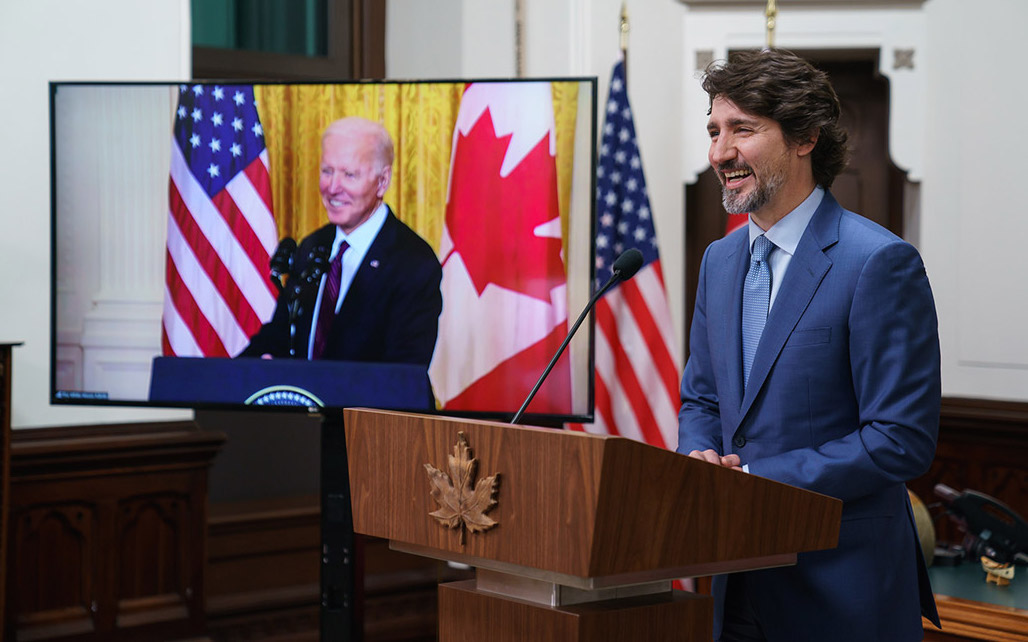U.S. President Joe Biden rejects the idea of an economy where workers have to compete for jobs. With an analysis you would expect from a social democratic government, Biden is calling for the U.S. to move to an economy where companies have to compete for workers.
In a full employment economy, it costs companies to maintain workers or hire new employees.
When Biden states that companies will have to compete for workers, that means businesses will have to provide wage increases. The wage increases amount to a redistribution of income from owners’ profits to workers.
A redistribution of income — from business profits to workers’ wages — is a classic social democratic policy objective.
Such a redistribution, should it occur, is the opposite of what has happened under neoliberalism, where workers’ incomes have not kept up with investment income.
Soon after taking office in January, Biden introduced a $1.9-trillion rescue plan to deal with the chaos created by the COVID-19 pandemic.
Job losses and business closures left Americans in need of emergency relief. In the longer term Biden wants the U.S. economy to deliver economic security through full employment.
U.S. Treasury Secretary Janet Yellen, the former Federal Reserve chair, predicts that under the Biden rescue plan the U.S. will attain full employment in 2022.
The plan itself requires congressional approval, which it is unlikely to receive in its entirety. Some significant new spending will no doubt take place, however.
While the willingness to move to a world where companies find it necessary to increase wages represents a major shift in U.S. priorities, it will also have an impact around the western world.
In 1979, over 40 years ago, following the G7 Venice summit, Canada dropped full employment as an economic priority and replaced it with fighting inflation. A degree of economic slack was thought necessary to prevent inflation. Rising wages were labelled inflationary.
The non-inflationary rate of unemployment or NAIRU (non-accelerating inflation rate of unemployment — set in a range with a low of 7.5 per cent) replaced full employment as the key economic measurement, leaving several million Canadians unemployed as a matter of government policy.
The basic policy of the Bank of Canada was, and remains, inflation targeting.
This is in sharp contrast with the U.S. Federal Reserve, which, as a part of its mandate, has a commitment to maximizing employment as well as fighting inflation and maintaining low long-term interest rates.
While Canadian governments talk predictably about job creation, it has meant subsidies to business and tax cuts, not investment in, say, green jobs.
Will the U.S. movement to full employment provoke an adoption of full employment by the Canadian government? Past experience suggests it is not that simple.
Expansion of U.S. government spending produces more rapid U.S. economic growth. A secondary effect is to increase U.S. imports.
In these circumstances, in the past, the Canadian economy has been able to expand as exports to the U.S. grew along with the U.S. economy.
With exports growing, Department of Finance officials are generally reluctant to boost Canadian government spending for fear of increasing Canadian imports, and offsetting the positive effects of a trade surplus for growth and the foreign exchange rate.
The standard Canadian policy is to ride the back of the U.S. business cycle while restricting Canadian government spending.
Such employment gains as then occur are the result of the U.S. expansion boosting Canadian economic activity. Employment creation happened as the result of U.S. policy, not Canadian initiatives.
Given the attachment to government austerity during an American boom, full employment is an unlikely result. In fact it would be surprising if it were the outcome of increased exports to the U.S.
Full employment requires a commitment by government and substantial public investment to become a reality.
In Canada the NDP have opened a debate about redistribution of wealth through taxation. This makes sense when the ultimate objective is economic democracy.
The debate needs to be widened to include economic measures that would promote full employment and encourage redistribution of income from profits to wages.
Redistribution of income may fall short of measures increasing economic democracy such as worker self-management or co-operative ownership, but it is far superior to the wage stagnation that ensued once inflation fighting replaced full employment as the economic priority.
Duncan Cameron is president emeritus of rabble.ca and writes a weekly column on politics and current affairs.
Image credit: Adam Scotti/PMO



